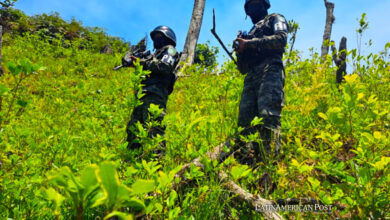What Is Happening in Honduras? Does Xiomara Castro Take Similar Measures to Bukele?
Honduras' President Xiomara Castro has chosen punitive populism as a way of dealing with the challenge posed by the violence in her country. Will the strategy work for her, as it did for Nayib Bukele, or will it be a failed gamble?.

Photo: TW-XiomaraCastroZ
LatinAmerican Post | Julián Andrés Pastrana Cuéllar
Listen to this article
Leer en español: ¿Qué está pasando en Honduras? ¿Xiomara Castro toma medidas similares a Bukele?
The images have gone around the world: dozens of half-naked prisoners in Honduran prisons, sitting one behind the other, while they are guarded by members of the public force of that Central American nation. A scene that seems copied from the neighboring country of El Salvador. This is the response given by the president of Honduras, the leftist Xiomara Castro, wife of the deposed former president of that country, Manuel Zelaya, to the wave of violence that has put her government in check. Days ago, a confrontation between rival gangs was recorded in a Tegucigalpa prison that left 46 inmates burned and shot.
The event, described by the Honduran president as a "monstrous murder of women", was added to a violent weekend in which 21 people were killed. Thirteen of them were victims of a massacre that occurred in Choloma, a municipality in the north of the country.
A Controversial Strategy
To contain this wave of violence, the president of Honduras has bet on some strict measures. In the opinion of some analysts, they seem to be copies of the neighboring president of El Salvador, Nayib Bukele, famous for his apparently successful security policy that has not been without criticism for alleged violations of human rights.
Among the measures ordered by Castro included the dismissal of Security Minister Ramón Sabillón, naming in his place General Gustavo Sánchez, until then director of the Honduran Police. Precisely, the Military Police was entrusted with an operation in the country's prisons that resulted in the confiscation of weapons, drugs, grenades, and satellite phones. It is expected that the Armed Forces will continue exercising control in the Honduran penitentiary centers for a period of one year, this in order for said spaces, in the words of the Honduran Secretary of State for National Defense, José Manuel Zelaya Rosales, "to stop be schools of crime”.
In addition to this military strategy, Xiomara Castro also declared a 15-day curfew in the cities of Choloma and San Pedro Sula. It is a measure that adds to the state of emergency in which the country has been in since December 6 of last year and which has been extended three times.
You can also read: Elections in Ecuador: Is Correism Back?
Serious Questions
These tactics to deal with crime have not been without criticism. Evelyn Escoto, Commissioner of the National Center for the Prevention of Torture, Cruel, Inhuman or Degrading Treatment in Honduras, told BBC Mundo that the measures promoted by Xiomara Castro "are a regression from the point of view of human rights." Likewise, she added that her country is not an island, but, on the contrary, it has "obligations and commitments in international rights, and we are obliged to guarantee those rights in prisons."
Will the Bkelista Strategy Work in Honduras?
The truth is that the experience of Honduras emulating the strategies of El Salvador seems to show that punitive populism, generally exercised by right-wing regimes, reports more political and electoral gains than the traditional discourse of some left-wing leaders oriented towards anti-punitiveness and combating social inequalities. These, according to them, are the breeding ground for crime and violence. This is demonstrated by examples such as Pinochet in Chile, Fujimori in Peru or Álvaro Uribe in Colombia, who enjoyed great popularity despite being involved in alleged corruption scandals and human rights violations.
The question is: will it help President Xiomara Castro to reissue the controversial measures of her counterpart Nayib Bukele?




